Welcome to season two of Flash Forward! We kicked off this season with a pretty unlikely future: the entire world goes face blind. Listen here:
In the episode we discuss what causes face blindness — also known as prosopagnosia — and the tricks that people use to remember their friends. We also go through all the things that would be easier (spying, hiding) and harder (police lineups, cocktail parties) in a world where we were all faceblind.
Today, about two percent of the population has some form of face blindness, or prosopagnosia. Some people with prosopagnosia have a hard time with acquaintances, while others struggle to recognize their own family members, and sometimes even themselves. If after this you’re thinking “hm, I wonder if I’m face blind,” you can take an unofficial online test here.
To figure out what this world might be like, I called up Dr. Jason Barton, a neurologist at the University of British Columbia who treats and studies people with face blindness. He told me that face blindness can happen for a lot of reasons: some people are born with it, and others acquire the trouble after a stroke, infection, tumor, or other kind of brain injury. You’ll have to listen to the episode to learn how it happens to all of us at once.
I also talked to two people who are face blind, since they have the best sense for what this might be like for the rest of us. Lisa Huang, a science fiction writer, and Jaydeep Bardhan, a mechanical engineering professor at Northeastern University, told me all sorts of really interesting things about how they do, or don’t remember people. Movies and TV shows? Tough for people with face blindness, especially when all the actors look the same.
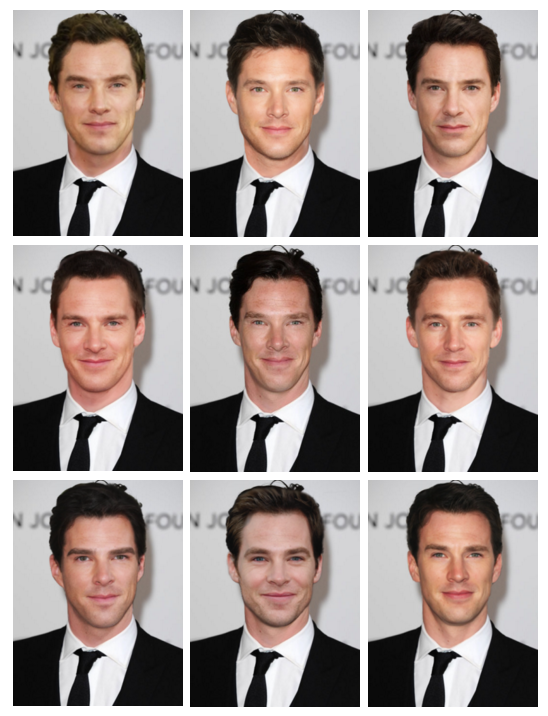
Via captcrieff.tumblr.com
We also talked about things like hair and makeup, how people might try to visually distinguish themselves when they can’t rely on their face to do it for them. And Barton suggested a whole other way to recognize people that has nothing to do with faces.
There’s a great Ted Chiang short story called “Liking What You See: A Documentary” about facial recognition. The story focuses not on face-blindness, but instead, the piece talks about a world in which people can elect to have their perception of beauty turned off. So nobody has an advantage for being prettier than anybody else. But according to Dr. Jason Barton, some people with prosopagnosia also struggle to tell things like age, sex, mood and even beauty of another face in front of them.
And in case you didn’t think this episode was dark enough, here’s another take on face blindness: a short film in which someone locks eyes with the perpetrator of a horrible crime, but can’t remember his face because he’s face blind.
What do you think? How might we get around face blindness? Would we just give up? Would we all wear go-pros and google glasses around? Would name tags come back into style?
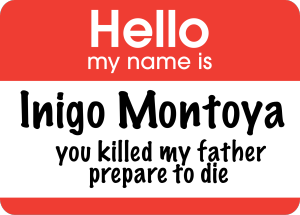
Flash Forward is produced by me, Rose Eveleth, and is part of the Boing Boing podcast family. The (awesome) art for this episode is by Matt Lubchansky. The intro music is by Asura and the Outtro music is by Broke for Free. The music for your drive time radio host was The Zombie Dandies. The voice of your drive time radio host was Mike Pesca, who is also the host of the not-fictional daily Slate podcast The Gist. The voice of our trusty scientist was Bethany Brookshire, you can follow her on Twitter at @scicurious. And the voice of our lovely public radio reporter was Tamara Krinsky, you can find her at @tamarakrinsky.
If you want to suggest a future we should take on, send us a note on Twitter, Facebook or by email at info@flashforwardpod.com. We love hearing your ideas! This week’s episode was suggested by Charlie Loyd.
And if you want to support the show, there are a few ways you can do that too! We have a Patreon page, where you can donate to the show. But if that’s not in the cards for you, you can head to iTunes and leave us a nice review or just tell your friends about us. Those things really do help.
That’s all for this future, come back next week and we’ll travel to a new one.
▹▹▹▹▹▹▹▹▹▹▹▹▹▹▹▹▹▹▹▹▹▹▹▹▹▹▹▹▹▹▹▹▹▹▹▹▹▹▹▹▹▹▹▹▹▹▹▹▹▹▹▹▹▹▹▹▹▹▹▹▹▹▹▹▹▹
TRANSCRIPT
Hello! And welcome, to Flash Forward! I’m Rose, and I’m your host.
Flash Forward is a podcast about possible, and not so possible futures. Every week we take on a specific potential tomorrow, and try to really overthink what it might be like. Every episode starts with a trip to the future, before we zip back to now, to talk to experts about what we just saw, and what it would really be like. Got it? Great.
This week, let’s start in the year 2034.
[Radio Chime] NPR Style host
This morning, investigative journalists at ProPublica revealed a report that new global drinking water sanitation pills are having serious health effects. The pills, developed and distributed by the United Nations to help global citizens turn irradiated and contaminated drinking sources into potable water, appear to include a small amount of nanoparticles that target a specific region of the brain called the fusiform gyrus. Right now, scientists and investigators are unsure of exactly what the impact of these nanoparticles might be, and the National Institute of Health has called together an emergency research group to investigate the claims.
[Jingle] Drive Time host // Mike Pesca
Listen, okay, so, have you heard this report? The United Nations gave out those pills for us to put in the water. We put them in the water. And NOW we’re hearing that they might be scrambling our brains? Great, great, good job UN. Why are we just hearing about this NOW? And don’t give me any of that “nobody knew about this nanoparticle” stuff COME ONE PEOPLE. Of course they knew. First it was fluoride, now this, please.
And! If that’s not enough, they’re saying that they don’t know what this stuff might do to us. They don’t know! Please, of course they know. They know! They expect us to believe they don’t know? This is the kind of abject lunacy that now passes for mainstream in this world. It’s bogus. And it’s amazing to me how automatically it’s believed.
Well, okay, if they don’t know, they don’t know! Well I’ve got some ideas. All it takes is a little thinking here, what might they want? They want us to say “oh yeah this is all great everything is great hunky dory.” So they turn off the thinking brain! The memory! The ability to synthesize! We still smile and push all the buttons on the machines and vote but we don’t THINK. Look, like, today, here’s an example. I’ve got a great memory, really, I remember everybody. Joe at the sandwich stop, Pete at the front desk, that weird boyfriend that some cousin brought to Thanksgiving once. I remember! Well this morning I went to the sandwich shop and I thought somebody new was working there, it wasn’t Joe. Didn’t look like him. But Joe’s got a nametag, and there it was, Joe, right there! And here’s the kicker, Joe didn’t recognize me either. Me! Mike! Every morning! Turkey club on rye! Nothing! And you know what happens when we can’t remember Mike at the sandwich shop? We can’t remember corruption! Lies!
Okay, anyway, let’s hear from you, if you’ve had anything weird happen, if you think you know about this UN funny-business, call us.
[Radio Chime] NPR Style host
Scientists called an emergency press conference today to announce an update in their findings regarding the possible side effects of the UN water cleansing pills. We take you now, live, to Washington D.C.
NIH Scientist: Hello, and thank you for coming today. After an independent review of the nanoparticles in the widely circulated CLEANSE pills, along with extensive testing of 200 subjects exposed to them, our team of researchers has come to some important conclusions. The first is that these pills carry no risk of illness or death, and that any reports of poisoning or death from these pills is unfounded.
What we did find however, was that 100% of people who have consumed water created by these pills — and we estimate that 95% of the global population falls into that category — have developed a condition called prosopagnosia, a disorder characterized by the inability to remember faces. This is a condition that was formerly rare. Today, however, and over the course of the next few months as the nanoparticles persist in our water supply, the condition will become nearly universal. We are still investigating other possible impacts from these nanoparticles. The National Institute of Health will continue to fund this emergency research group to learn more about other possible effects.
Thank you, and I will now take questions.
<Fade out>
Rose: Okay, so, in this future, the entire world goes face blind, unable to recognize who people are by their face. The official name for this condition is prosopagnosia, and it is a real thing that some people do have, and it comes in varying degrees of severity. Some people have a hard time with acquaintances, and others struggle to recognize even their own family members, and sometimes even themselves.
Jason Barton: For us, that’s what makes us sit up. If you’re having trouble recognizing a close relative or yourself. I hope it’s not incorrect to say funniest, but they laugh at themselves, is when they have these experiences where they don’t realize they’re looking in a mirror. I mean how freaky is that, right?
Rose: That’s Jason Barton, a neurologist and researcher at the University of British Columbia who treats and studies people with face blindness. Now, face blindness can happen for a lot of different reasons — some people are born with it, and others acquire the trouble after a stroke, infection, tumor, or other kind of brain injury. Or, in our future, targeted nanoparticles. But, that’s never happened before. And probably won’t ever happen.
Now, there’s no one single area for facial recognition in the brain. There are lots of networks and pieces involved, so you can’t just cut out the “face seeing” parts. But that also means that for some people, whatever has messed up the brain’s ability to detect faces can also mess up other stuff too. In other words, in a world where we’re all faceblind, we might struggle with other face-related processing as well.
Barton: Like, can they recognize if someone is sad or happy, or tell how old they are, what gender they are, stuff like that.
Rose: So in this future, depending on how these nanoparticles work, we might not simply struggle to recognize each other, but we might also have trouble telling how old people are, or whether they’re happy or sad. That complicates things, a lot, so for our purposes let’s stick with just the facial recognition stuff for now. And I figure the best way to figure out what a world full of face blind people might be like is to talk to some people who actually are face blind right now.
Lisa Huang: I had no idea actually that most people didn’t recognize people, didn’t have the trouble I did with recognizing people. That most people didn’t worry about recognizing their parents after not seeing them for a while. I thought that was totally normal, and that I was just a little bad with faces.I knew I was bad at faces but I didn’t think I was abnormally bad.
Rose: That’s Lisa Huang, a science fiction writer. And this is Jay Bardhan, a mechanical engineering professor at Northeastern University.
Jaydeep Bardhan: I was a post-doc, so I guess I was 27 or 28, and as part of starting the job I went and got an overall psychological profile done on a couple of aspects for ADD, and then doc called me back a week later and he was like “can we do a couple of batteries,” and he told me that the reason he called me back was that results were so weird in this one area that he was like “I must have recorded it wrong.” At that point, when he got the full diagnosis, he said “well this is actually a condition.” It was a revelation, because I had known for a long time that something was a little off.
Lisa: It’s kind of interesting to be able to put a name to it now, and knowing that I’ve got this going on. Everything makes a lot more sense now
Rose: Both Lisa and Jay struggle with faces to varying degrees, and in different ways. But talking to them I got a good sense for what things might be like without the ability to recognize people by their face.
Lisa: I do aerial circus, and my aerial partner, you know, twice a week we’d be like dangling each other from the ceiling 20 feet up in the air, and then we went to a play together with a big group of friends, and he was wearing khakis and a button down instead of gym clothes and I completely couldn’t recognize him. It was very embarrassing and a little bit awkward, because I’ve known you for years now and you hold me 20 feet in the air every week, and I didn’t recognize you in different clothes.
Jay: There’s that moment in every police or detective drama where there’s a sketch artist brought in, and I never can tell who that person is. And in a show there are only 15 people, so every one else knows who is the person being sketched and I have literally no idea. Just, they all look like high school art charcoal drawings to me, I have no idea.
Rose: There are some obvious things that would get pretty complicated if we couldn’t recognize faces: police lineups, doormen and security guards, cocktail parties. Other things might get easier, like spying or disguising yourself.
Jay: Literally the mustache and fake glasses, like the Groucho Marx costume, suffices for everyone.
Rose: But in talking to Lisa and Jay, I learned about some less obvious impacts too. Like, they both talked a lot about their struggles watching movies and TV.
Jay: You know the movie Heat? Al Pacino, Robert De Niro? Sort of good cop bad guy the whole thing? I went to see that in theaters and half way through the movie I asked my friends “hey are they dressing up as eachother is there some weird disguise thing going on?” and they looked at me like I was crazy, and now that I’ve got the diagnosis I understand it was crazy. No one else thinks they are interchangeable people, they don’t look alike.
Lisa: Hollywood really likes to cast the same looking person a lot of the time, like they’ll cast all of the same white guy with the same face. So a movie like Oceans 11, completely lost, I did not even realize when I watched that movie that I was supposed to be able to tell them apart. I was like “oh this must be one of those movies where you kind of can’t tell everybody apart” I did not realize this was a thing. Any sort of military movie.
Jay: Who is, Channing Tatum vs Ryan Gosling I don’t know!
Rose: So in a world where we’re all faceblind, TV shows and movies are going to have to cast more diverse actors if they want anybody to be able to follow their plot lines. Which, hey, is a good thing!
Now, people with face blindness can tell people apart, they simply don’t use faces to do so. Which means that in a world of face blind people clothing and hair choices might become even more important, because that will be how people recognize one another.
Jay: Yes absolutely, and I as a teacher, that’s something that I particularly appreciate. I appreciate it enormously when students express themselves in some way where I can immediately tag like, okay she has that hair or four earrings, or whatever it is. It’s really, then I can remember it and that improves the working relationship.
Rose: But that also means that people would have to keep their styles the same, because changing them drastically is essentially like getting major plastic surgery to change your face. You could confuse everybody.
Lisa: Like if I have a girlfriend who cuts and dyes her hair between one week and the next I probably will not recognize her even if I’ve known her for months and months. Or if someone usually has a beard and they shave it off. Stuff like that really throws me.
Rose: I propose we all get face tattoos!
Barton: Yeah, you can imagine that might be something because that would be something that would be hard to eliminate. Maybe we get barcodes in our foreheads.
Rose: This brings us to some of the tech based solutions we might see. Google Glass might find an audience when we all need help recognizing each other.
Jay: Maybe everybody wears a GoPro, otherwise you’re not necessarily going to know who people are. Like a big data form of Memento, every day you log in and these are the people I met, and you have augmentation so when you meet new people you get a little display that says “that’s Bill, you saw him yesterday afternoon, he works with you.”
Rose: This kind of stuff pretty quickly veers into a kind of dystopia, surveillance land. But, Lisa has a lower tech solution.
Lisa: I also would suspect that name tags might become a little bit more of a thing. I have a good friend who’s face blind and a couple of friends on line and my mom and sister, and so we talk about this stuff, and we’re always mourning people not wearing name tags
Rose: Or, what if we simply didn’t use faces at all anymore. What if we used something… else. Like, hands?
Barton: Think about what a cocktail party might look like if it’s all about hands instead of faces. Maybe we talk with our hands way more. I don’t know, would there be a whole new set of etiquette around hands as opposed to faces? Maybe covering your hands would be seen as rude, wearing a glove would be seen, as like going to rob a bank. What would the makeup industry, would it shift to hands instead of faces? It’s kind of weird isn’t it. I mean, think about the way we use faces in the way we talk, to say something like, “on the face of it” so would you say “on the hand of it now?” “Facing up to something.”
Jay: Interesting, I like that a lot. When I think about handshakes, they’re pretty individual. Or holding hands up or high fiving or what have you, gestural. You ever do that as part of an ice breaker? “Hi I’m Jay,” and they raise their hands over their heads, hi Jay, and they raise their hands over their head. It would be an interesting way to start, I’m imagining the uppermost levels of government and everyone is doing this to remind themselves of who’s on the cabinet.
Rose: Okay so, maybe we wouldn’t go with hands. And this bring us to another question; would we have to go with anything? Lisa hopes that we might just all kind of stop caring about whether we recognize each other or not.
Lisa: After you told me this idea of this imaginary future, it actually sounds very, you know, relaxing to me. The idea of not being expected to remember anybody.
Rose: But Barton thinks that human to human recognition is too important to give up. We use it all the time, in every situation. We have a whole network in the brain dedicated to being able to recognize someone we know.
Barton: Social communication isn’t only about knowing whether the person in front of you is happy or sad or angry. It’s also knowing who it is, and what kind of things are going to make them happy or sad or angry. “Don’t talk about such and such with so and so,” or “so and so knows about this I don’t have to give the big explanation.”
Rose: But no matter how we did it, Lisa says, of all the possible futures out there, this one wouldn’t be so bad.
Lisa: I guess my biggest advice is that it’s not that big of a deal. I talk about it being stressful and having anxiety from it, and watching movies is harder and stuff like that, but all in all it’s pretty far down the list of things that cause real problems for me. It absolutely doesn’t interfere with my ability to have relationships with people or close friendships or interact socially with people. It’s not going to be that bad, we’ll be fine.
[Music Up]
Rose: For more about face blindness, including links to a few tests you can take yourself to see how good you are with faces, head to Boing Boing where I’ll put more more links and additional information.
Flash Forward is produced by me, Rose Eveleth, and is part of the Boing Boing podcast family. The intro music is by Asura and the outtro music is by Broke for Free. The music for your drive time radio host was by The Zombie Dandies. The voice of your drive time radio host was Mike Pesca, who is also the host of the not-fictional daily Slate podcast The Gist. Check it out. The voice of our trusty scientist was Bethany Brookshire, you can follow her on Twitter at @scicurious. And the voice of our lovely public radio reporter was Tamara Krinsky, you can find her acting, writing and science adventures on Twitter where she’s @tamarakrinsky.
If you want to suggest a future we should take on, send us a note on Twitter (@ffwdpod), Facebook or by email at info@flashforwardpod.com. We love hearing your ideas, so send em on over.
And if you want to support the show, there are a few ways you can do that too! We have a Patreon page, where you can donate to the show. But if that’s not in the cards for you, you can head to iTunes and leave us a nice review or just tell your friends about us. Those things really do help.
That’s all for this future, come back next week and we’ll travel to a new one.

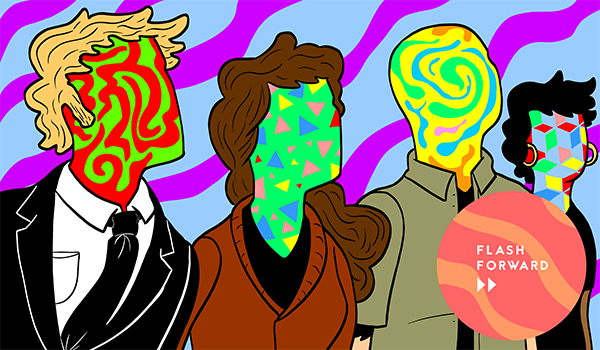
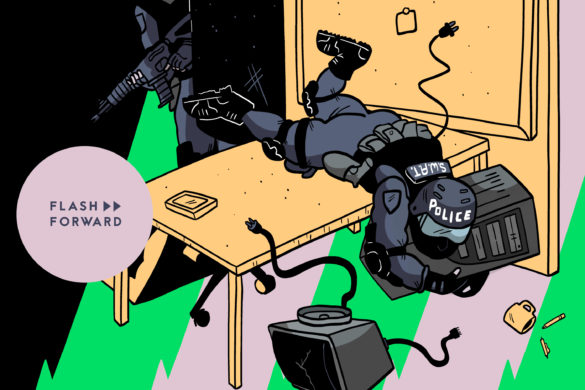
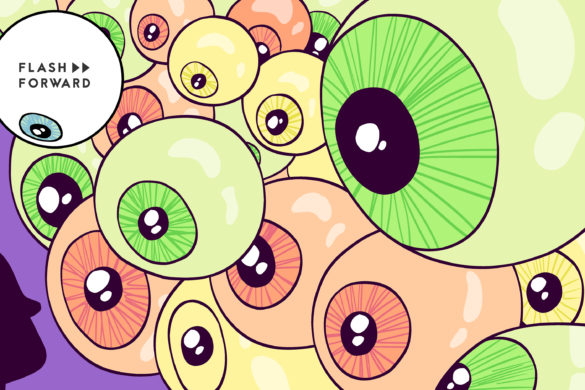
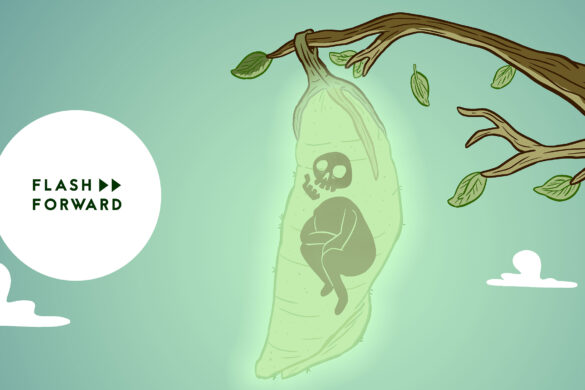
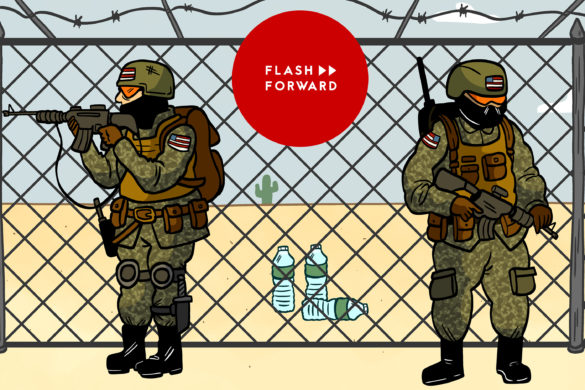
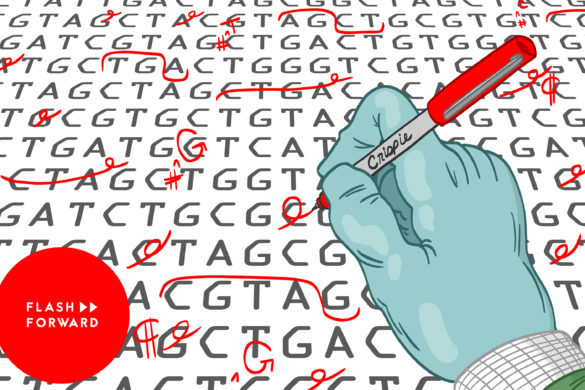
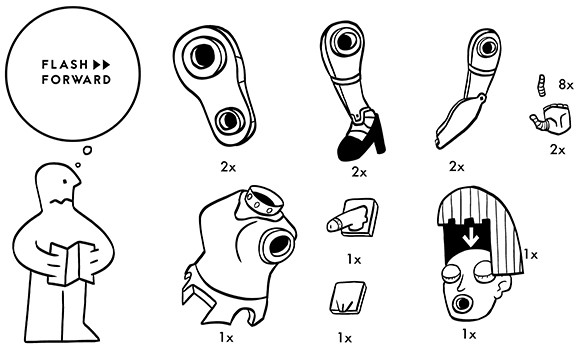
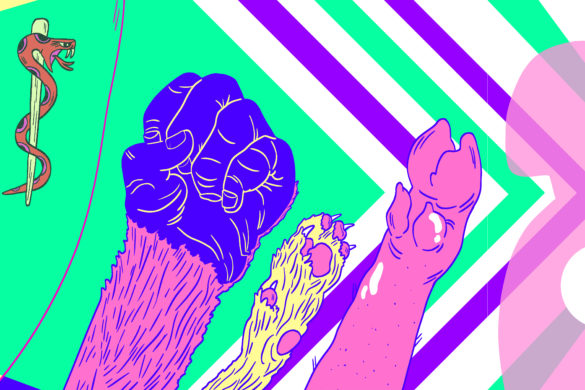
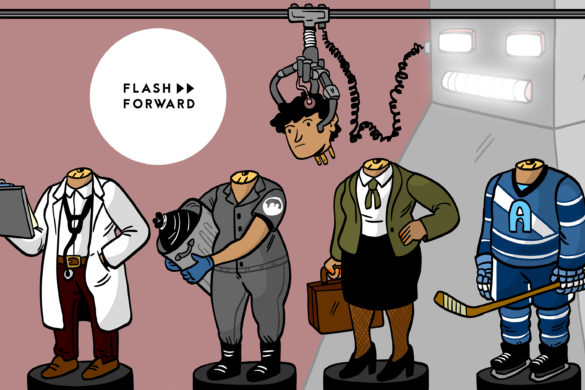
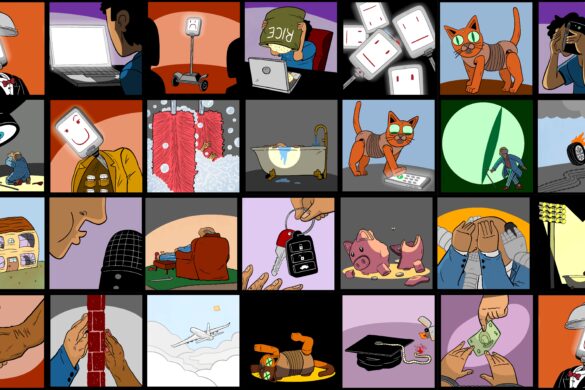
11 comments
=== popurls.com === popular today
yeah! this story has entered the popular today section on popurls.com
[…] What Would Happen If The Entire World Went Face Blind? […]
[…] Tuesday, the podcast that I host and produce started its second season. The show is called Flash Forward, and it’s weird and fun and surprising. Every episode takes on […]
[…] Welcome back to Rose Eveleth’s wonderful podcast about the future, now called Flash Forward. […]
Hey why no upload to Sound Cloud? I was subscribed to this on there, and it was really liked that I would get a notification on my phone when a new episode was out. I know you guys changed names and everything, but still???
Also I want to add, I think you sadly done a horrible transition to the new name 🙁
I was wondering when this episode/season would come out because its been forever. So I I had to go into hardcore investigation mode to find this site and learn about the name change. I think you should have made a short episode of an announcement on all the different medians of where the episodes were posted (Sound Cloud, iTunes, etc) about how and where to find the new episodes/season.
Hi Marc!
Sorry you’ve had a hard time finding us! But you’re here now! Welcome back!
We’ll be back on Soundcloud soon. We had so few people subscribed the way you do, compared to RSS (which is here, if you want it: http://rss.acast.com/flashforward) that it wasn’t our first priority. You can find constant updates also on FB: https://www.facebook.com/fashforwardpod/ and Twitter: https://twitter.com/ if you use either of those.
Thanks for listening and for doing all that detective work to join us again!
▹▹ Rose
[…] Possible Futures […]
Haven’t listened to the podcast yet … came here via a link from nytimes … this topic is always very live for me as I am (I estimate) moderately face-blind. Takes me a realllllly long time to recognize people and if I don’t see them for a few months they’re strangers all over again the next time. So inconvenient, makes me look like I don’t care enough to remember you. It’s hard to explain and I don’t feel that ppl always believe me when I try.
Movies, right – who is that character?? Is that the same person that was sympathetic or hateful a moment ago (differently dressed now)? And if there are two males or females of similar ages and sizes, I will be lost for all or most of the film. Etc.
So of course I love the idea that everyone would have this condition – I wouldn’t be the oddball who sometimes knows who just greeted me by name but often does not. I don’t think I know people by their face no matter how well I know them and recognize them, and the people in this imaginary situation would learn to cope the same way.
Thank you for covering this topic. Some inaccuracies, but overall a good effort. I recommend https://www.faceblind.org/links/index.html for a better understanding. Fun fact: Oliver Sacks was severely face blind.
[…] Welcome to season two of Flash Forward! We kicked off this season with a pretty unlikely future: the entire world goes face blind. Listen here: In the episode we discuss… […]
[…] Še en fin podkast o prihodnosti Flash Forward začenja drugo […]